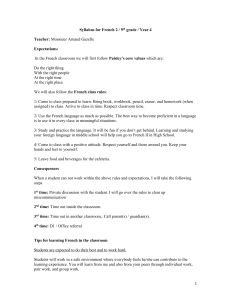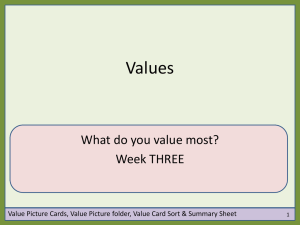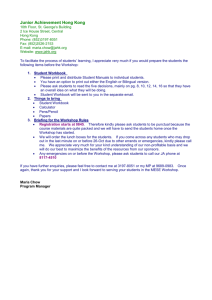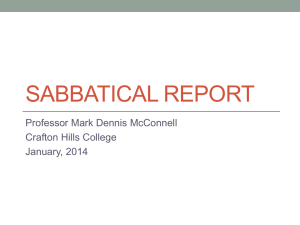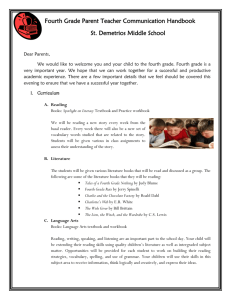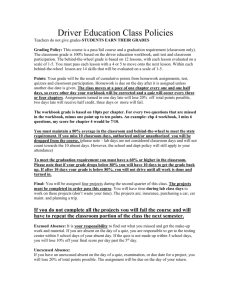Syllabus
advertisement
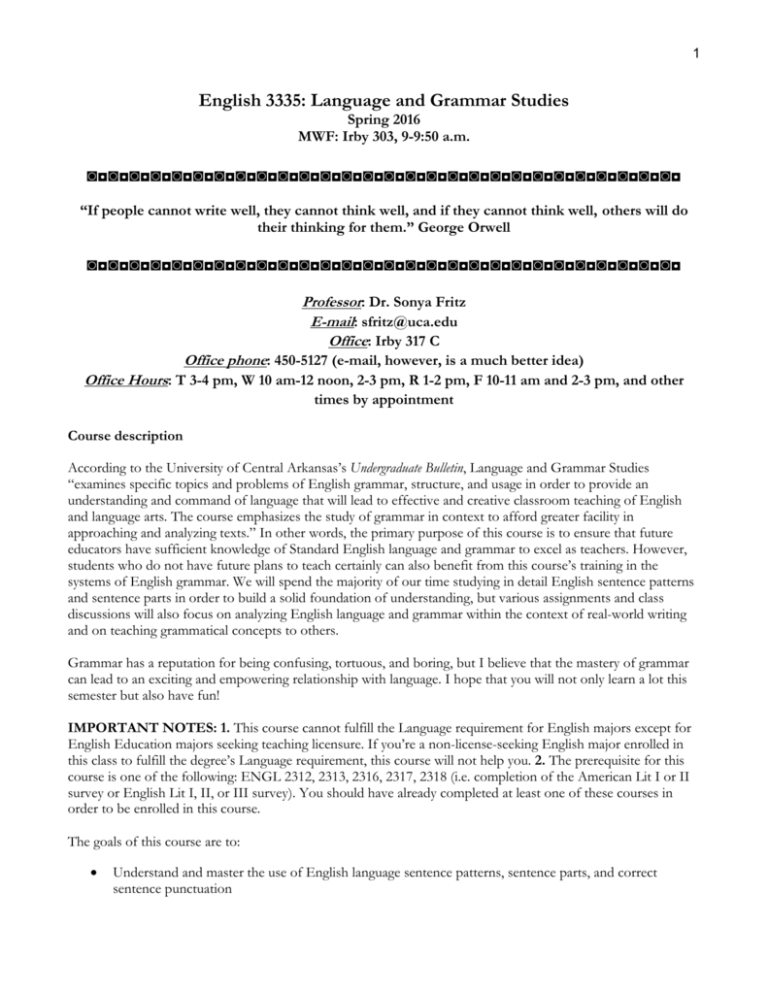
1 English 3335: Language and Grammar Studies Spring 2016 MWF: Irby 303, 9-9:50 a.m. ◙◘◙◘◙◘◙◘◙◘◙◘◙◘◙◘◙◘◙◘◙◘◙◘◙◘◙◘◙◘◙◘◙◘◙◘◙◘◙◘◙◘◙◘◙◘◙◘◙◘◙◘◙◘◙◘ “If people cannot write well, they cannot think well, and if they cannot think well, others will do their thinking for them.” George Orwell ◙◘◙◘◙◘◙◘◙◘◙◘◙◘◙◘◙◘◙◘◙◘◙◘◙◘◙◘◙◘◙◘◙◘◙◘◙◘◙◘◙◘◙◘◙◘◙◘◙◘◙◘◙◘◙◘ Professor: Dr. Sonya Fritz E-mail: sfritz@uca.edu Office: Irby 317 C Office phone: 450-5127 (e-mail, however, is a much better idea) Office Hours: T 3-4 pm, W 10 am-12 noon, 2-3 pm, R 1-2 pm, F 10-11 am and 2-3 pm, and other times by appointment Course description According to the University of Central Arkansas’s Undergraduate Bulletin, Language and Grammar Studies “examines specific topics and problems of English grammar, structure, and usage in order to provide an understanding and command of language that will lead to effective and creative classroom teaching of English and language arts. The course emphasizes the study of grammar in context to afford greater facility in approaching and analyzing texts.” In other words, the primary purpose of this course is to ensure that future educators have sufficient knowledge of Standard English language and grammar to excel as teachers. However, students who do not have future plans to teach certainly can also benefit from this course’s training in the systems of English grammar. We will spend the majority of our time studying in detail English sentence patterns and sentence parts in order to build a solid foundation of understanding, but various assignments and class discussions will also focus on analyzing English language and grammar within the context of real-world writing and on teaching grammatical concepts to others. Grammar has a reputation for being confusing, tortuous, and boring, but I believe that the mastery of grammar can lead to an exciting and empowering relationship with language. I hope that you will not only learn a lot this semester but also have fun! IMPORTANT NOTES: 1. This course cannot fulfill the Language requirement for English majors except for English Education majors seeking teaching licensure. If you’re a non-license-seeking English major enrolled in this class to fulfill the degree’s Language requirement, this course will not help you. 2. The prerequisite for this course is one of the following: ENGL 2312, 2313, 2316, 2317, 2318 (i.e. completion of the American Lit I or II survey or English Lit I, II, or III survey). You should have already completed at least one of these courses in order to be enrolled in this course. The goals of this course are to: Understand and master the use of English language sentence patterns, sentence parts, and correct sentence punctuation 2 Acquire and demonstrate competence in the use of Standard English on oral and written assignments Reflect upon and demonstrate the teaching of grammar, usage, and mechanics in context Develop the command of grammar and language necessary to teach effectively in elementary, middle, and/or secondary schools and to excel in advanced English and writing courses Required texts and materials Kolln, Martha, Loretta Gray, and Joseph Salvatore. Understanding English Grammar. 10th ed. New York: Pearson, 2016. Funk, Robert. Exercises for Understanding English Grammar. 10th ed. New York: Pearson, 2016. You are also required to have: access to a computer so that you can check our Blackboard shell for the course as necessary a UCA e-mail account that you check daily insights and comments that you develop and voice in class. The success of this course depends in large part on its members’ willingness to seriously and actively engage the material and participate in discussions and in-class assignments. Policies Attendance. Daily attendance will be taken in this class. You are allowed three unexcused absences. Each subsequent unexcused absence will result in the deduction of five percentage points from your final grade. Please use your three absences wisely—they are not intended for those days when you feel like sleeping in, but rather for days when you cannot come to class but your absence is not excused. Nine or more absences, excused or otherwise, provide grounds for the student to be dropped from the course. You are responsible for providing evidence and/or appropriate documentation to substantiate excused absences. Excused absences can include illness requiring a doctor’s visit, the serious illness of an immediate family member or illness of a dependent, the death of a relative, etc. Please direct any questions concerning what constitutes an excused absence to me. If you know in advance that you will miss a class due to an excused absence, you are responsible for informing me and making any necessary arrangements to make up class work. Keep in mind that trips out of town for weddings or family vacations and children’s school programs or ceremonies are not excused absences. Please also try to avoid scheduling routine medical check-ups, such as dental cleanings or yearly physicals, during class time—I will not excuse these absences. It is important for all of us to respect one another’s time and arrive promptly for class. Students who arrive to class after half of the class period (calculated by the duration of the class period in minutes) or more has passed will be counted absent. Students who arrive to class after attendance has been taken are responsible for checking with me after class to make sure their attendance has been recorded. Chronic tardiness will be penalized by counting each third tardy as an unexcused absence. Students should also come to class planning to stay for the duration of the period. An early departure from class will be recorded as a tardy and is subject to the same penalties. If you are absent on the day of an exam, you are responsible for contacting me as soon as possible to schedule the make-up exam. If your absence is excusable, you are responsible for providing documentation to substantiate this at the time of the make-up exam. Ten late points will be deducted from the exam grade if the absence is not excused (i.e., you overslept); I also reserve the right to refuse to allow a student with an unexcused absence to make up an exam. Five late points may also be deducted if your absence is excused but you do not contact me in 3 a timely manner to schedule the make-up exam. Unless other arrangements have been made with me, any exam that is not made up within two weeks of the original exam date will receive a grade of zero (0). Students who miss class are responsible for obtaining information regarding missed class notes, material, and assignments. It is my policy to email students information regarding missed class material only for excused absences and only when the student has sent a request via email specifying student name, course number and section, and class date(s) missed. I strongly recommend that students also talk with their classmates about what they have missed, as all I can offer students are any Power Point slides and/or handouts used during the class period. Class preparedness. Students need to complete the assigned reading before class and bring assigned reading materials to class in order to better engage in discussion and class-work. Failure to bring the appropriate assigned reading materials to class and/or failure to demonstrate completion of the assigned reading through class discussion will result in an unexcused absence for that day’s class. Unexcused absences accrued in this way are subject to all the penalties and consequences outlined in the attendance policy. Classroom Behavior. Disruptive classroom behavior is defined as anything that would interfere with an instructor's ability to conduct the class or the ability of other students to profit from the instructional program. All individuals and the opinions they express in class are to be treated with respect during class discussions. Students who are asked to leave class for disruptive behavior will be counted absent for that day. Appropriate Attribution. Any assignment that fails to include clear and appropriate attribution of sources will receive a grade of zero (“0”). Do not consult secondary sources for your work unless explicitly instructed to do so. Public-access internet sources such as SparkNotes and Answers.com are not appropriate to use in this course at any time. Any assignments that reflect unauthorized aid will receive a grade of zero (“0”). Bringing visitors to class. Students must receive permission from me in advance in order to bring any visitors to class. If you have a child-care emergency and need to bring a child with you to class, I am willing to work with you as best I can; however, little ones must be able to be expected to remain reasonably still and quiet for the duration of the class. Please see me if you have any questions about this. E-mail, phone, and fax. I will not discuss grades via e-mail or over the phone and, unless otherwise specified, I will not accept assignments attached to e-mail messages. I am happy to answer via email any student questions— including questions about assignments—that will take me less than 5 minutes to answer. Any questions that require a longer and more involved answer will be deferred to a face-to-face meeting. The English department will not accept papers or excuses for absences faxed to me. Feedback on student work. I want all students to meet their full potential in this course this semester. I encourage students to ask for clarification if they are confused about an assignment and to feel free to come to me for help on their work. However, I will not pre-grade, edit, or proofread students’ work for them; I will offer feedback, but only when students formulate and articulate specific questions about their work that they want me to address. I do this because I want all students to function as active thinkers and learners throughout the semester; this is not happening if I am doing the work of cataloging every aspect of a paper that a student needs to change or improve. Likewise, students should understand that getting feedback on their work does not guarantee that they will earn a certain grade on the assignment. Electronic devices. Students who use electronic devices in an inappropriate way during class will be asked to leave and will lose the privilege of using electronic devices in class. Cell phones must remain off (not simply on vibrate) and out of sight in one’s pocket or bag for the duration of the class. 4 Evaluations. Student evaluations of a course and its professor are a crucial element in helping faculty achieve excellence in the classroom and the institution in demonstrating that students are gaining knowledge. Students may evaluate courses they are taking starting on the Monday of the thirteenth week of instruction through the end of finals week by logging in to myUCA and clicking on the Evals button on the top right. Scholastic Dishonesty Academic Integrity and Scholastic Dishonesty. The University of Central Arkansas affirms its commitment to academic integrity and expects all members of the university community to accept shared responsibility for maintaining academic integrity. Students in this course are subject to the provisions of the university's Academic Integrity Policy, approved by the Board of Trustees as Board Policy No. 709 on February 10, 2010, and published in the Student Handbook. Penalties for academic misconduct in this course may include a failing grade on an assignment, a failing grade in the course, or any other course-related sanction the instructor determines to be appropriate. Continued enrollment in this course affirms a student's acceptance of this university policy. Title IX disclosure. If a student discloses an act of sexual harassment, discrimination, assault, or other sexual misconduct to a faculty member (as it relates to “student-on-student” or “employee-on-student”), the faculty member cannot maintain complete confidentiality and is required to report the act and may be required to reveal the names of the parties involved. Any allegations made by a student may or may not trigger an investigation. Each situation differs and the obligation to conduct an investigation will depend on those specific set of circumstances. The determination to conduct an investigation will be made by the Title IX Coordinator. For further information, please visit: https://uca.edu/titleix. *Disclosure of sexual misconduct by a third party who is not a student and/or employee is also required if the misconduct occurs when the third party is a participant in a university-sponsored program, event, or activity. Other University Policies. Please be sure to familiarize yourself with the policies outlined in the UCA Student Handbook. Students needing support service The University of Central Arkansas adheres to the requirements of the Americans with Disabilities Act. If you need an accommodation under this Act due to a disability, please contact the UCA Office of Disability Services, 450-3613. Building Emergency Plan An Emergency Procedures Summary (EPS) for the building in which this class is held will be discussed during the first week of this course. EPS documents for most buildings on campus are available at http://uca.edu/mysafety/bep/. Every student should be familiar with emergency procedures for any campus building in which he/she spends time for classes or other purposes. The University Writing Center The UCA Writing Center, located in Thompson 109, offers students one-on-one tutoring and online assistance with their writing. For more information, see the web site: www.uca.edu/writingcenter. Course Requirements and Grade Determination: No extra credit will be offered in the class. Grades—including final averages—will not be rounded up, except in the case of 59.5/ 69.5/ 79.5/89.5. 5 Final grade values: A 90-100 B 80-89 C 70-79 D 60-69 Exam #1 Exam #2 Exam #3 Final exam Homework, class-work, and class participation Teaching grammar assignment F 59 15% 15% 17% 20% 18% 15% The exams will be objective, covering the material that we have addressed in class and varying in format according to the material. The teaching grammar assignment asks students to sign up in groups for a particular grammatical concept and then create materials for teaching this concept, including handouts and an in-class presentation. More information on this assignment, including an assignment sheet and the grammatical concept sign-up sheet, will be presented in class on September 4. Homework is due at the beginning of the class period on the assigned due date. Typically, I will not collect or correct homework; I will check it visually during class and mark it “completed” or “missing”. Late homework will not be accepted with the exception of excused absences. Class-work and class participation will also be noted accordingly. Schedule of Reading, Assignments, and Exams This schedule is subject to change at the professor’s discretion in order to best meet the learning needs of the class. The readings and assignments listed under each date are those that you will be expected to have completed by that date. Most homework assignments are listed here—others may be announced in class as appropriate. Friday, January 8: Introduction to course: the study of grammar (ch. 1 in textbook). Monday, January 11: Words and phrases/open classes. Textbook: pp. 16-top of 24. Workbook: read pp. 1112, do exercise 2.1. Wednesday, January 13: Words and phrases/open classes, continued. Texbook: pp. 238-55. Workbook: read pp. 15-16, do exercise 2.2. Friday, January 15: Words and phrases/open classes, continued. Textbook: review pp. 16-24 and pp. 238-55. Workbook: do exercises 2.4 and 12.3. Monday, January 18: Martin Luther King Day, no class. Wednesday, January 20: Prepositions and prepositional phrases. Textbook: pp. 24-26, pp. 112-14, pp. 26871.Workbook: do exercise 2.3. Friday, January 22: Introduce the teaching grammar assignment. Monday, January 25: Words and phrases/open classes, review. Textbook: do exercise 6 on p. 42. Workbook: read p. 143, do exercises 11.2 and 12.1. 6 Wednesday, January 27: Sentence patterns. Textbook: pp. 29-60, pp. 351-55. Workbook: read pp. 25-26, do exercise 3.1 numbers 1-5. Be sure to diagram the sentences, and instead of identifying the sentence pattern numbers, identify the type of the predicating verb (i.e. be, linking, transitive, intransitive). Friday, January 29: Sentence patterns. Textbook: pp. 29-60. Workbook: do exercise 3.1 numbers 5-10. Be sure to diagram the sentences, and instead of identifying the sentence pattern numbers, identify the type of the predicating verb (i.e. be, linking, transitive, intransitive). Monday, February 1: Sentence patterns. Textbook: pp. 29-60. Workbook: do exercise 3.2. Instead of identifying the sentence pattern number, diagram each sentence. Wednesday, February 3: Sentence patterns. Textbook: pp. 29-60. Workbook: do exercise 3.4. Be sure to diagram the sentences, and instead of identifying the sentence pattern numbers, identify the type of the predicating verb (i.e. be, linking, transitive, intransitive). Friday, February 5: Group-work day, no class. Use the time to meet with your group to think through your teaching grammar assignment. Monday, February 8: Sentence patterns. Textbook: pp. 29-60. Workbook: do exercise 3.3. Diagram the sentences and identify the type of predicating verb instead of the sentence pattern number. Wednesday, February 10: Sentence patterns. Textbook: pp. 29-60. Workbook: read p. 35 and do exercise 3.5. A (don’t worry about the sentence pattern number) AND complete the worksheet posted on Blackboard. Print out the worksheet and bring it to class with you in addition to your work. Friday, February 12: Exam #1 Monday, February 15: Expanding the main verb. Textbook: pp. 65-73. Workbook: read pp. 39-40 and do exercise 4.1. Choose any five of the 10 sentences and diagram them as well. Wednesday, February 17: Expanding the main verb. Textbook: review pp. 65-73. Workbook: review pp. 3940 and do exercise 4.2. Friday, February 19: Expanding the main verb. Textbook: pp. 74-77. Workbook: do exercise 4.6. Monday, February 22: Changing sentence focus: Textbook: pp. 86-top half of 95 (passive voice). Workbook: read pp. 53-54 and do exercise 5.1. Diagram numbers 1-3 in both their active and passive versions. Wednesday, February 24: Changing sentence focus. Textbook: review pp. 86- top half of 95. Workbook: do exercise 5.3 and diagram the active form of each sentence. Friday, February 26: Words and phrases/closed classes. Textbook: pp. 260-71. Workbook: read p. 151 and do exercise 13.1. Diagram the sentences in section B as well. Monday, February 29: Words and phrases/closed classes. Textbook: review pp. 266-71. Workbook: do exercise 13.2. Wednesday, March 2: Words and phrases/closed classes. Textbook: pp. 271-76. Workbook: do exercise 14.4. Friday, March 4: Exam #2 7 Monday, March 7: Modifiers of the verb/adverbials. Textbook: pp. 108-16. Workbook: read p. 69 and do exercise 6.1. Diagram the sentences as well. Wednesday, March 9: Modifiers of the verb/adverbials. Textbook: pp. 108-24. Workbook: do exercise 6.2. Friday, March 11: Modifiers of the verb/adverbials. Textbook: review pp. 108-24. Workbook: do exercises 6.3 and 6.4. Monday, March 14: Modifiers of the noun/adjectivals. Textbook: pp. 128-top of 137. Workbook: read pp. 79 and 81 and do exercises 7.1 and 7.2. Wednesday, March 16: Modifiers of the noun/adjectivals. Textbook: pp. 137-58. Workbook: read pp. 83-84 and p. 87 and do exercises 7.3 and 7.4. Friday, March 18: Modifiers of the noun/adjectivals. Textbook: review pp. 137-158. Workbook: read p. 93 and do exercises 7.5 and 7.6. Monday, March 21: Spring break, no class. Wednesday, March 23: Spring break, no class. Friday, March 25: Spring break, no class. Monday, March 28: Noun phrase functions/nominals. Textbook: pp. 163-76. Workbook: read pp. 99 and 101-02 and do exercises 8.2 and 8.3 part A. Wednesday, March 30: Noun phrase functions/nominals. Textbook: pp. 177-85. Workbook: read p. 107 and do exercises 8.4 and 8.5. Friday, April 1: Noun phrase functions/nominals. Textbook: review pp. 163-85. Workbook: do exercises 8.6. part A and 8.7. (We will try to do 8.9 as an in-class assignment.) Monday, April 4: Exam #3 Wednesday, April 6: Pronouns. Textbook: pp. 280-92. Workbook: do exercise 14.1, both parts. Friday, April 8: Coordination. Textbook: pp. 209-20. Workbook: read p. 129 and do exercises 10.2 and 10.3. Monday, April 11: Purposeful punctuation. Textbook: pp. 324-31. Workbook: read p. 133 and do exercise 10.4. Wednesday, April 13: Purposeful punctuation. Textbook: pp. 324-31. Workbook: read p. 169 and do exercise 16.1. Friday, April 15: Purposeful punctuation. Textbook: pp. 324-31. Workbook: do exercises 16.2 and 16.3. Monday, April 18: Grammar in context. Homework: Do the assignment posted on Blackboard. Print it out along with your work and bring it with you. 8 Wednesday, April 20: Grammar in context. Homework: Do the assignment posted on Blackboard. Print it out along with your work and bring it with you. Wednesday, April 27: Final exam, 2-4 pm.
